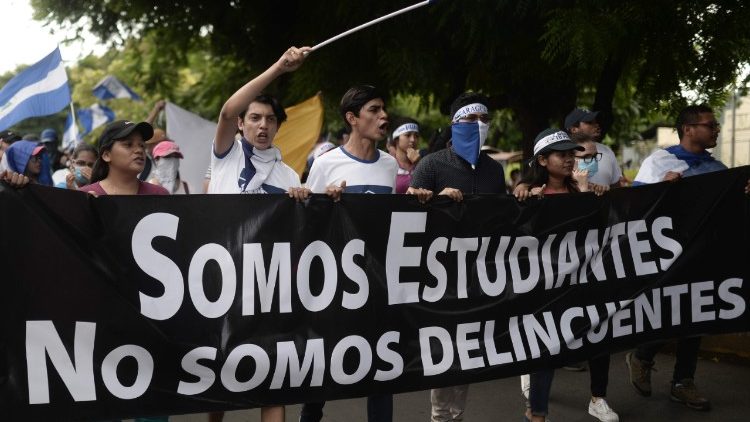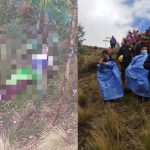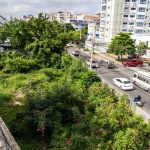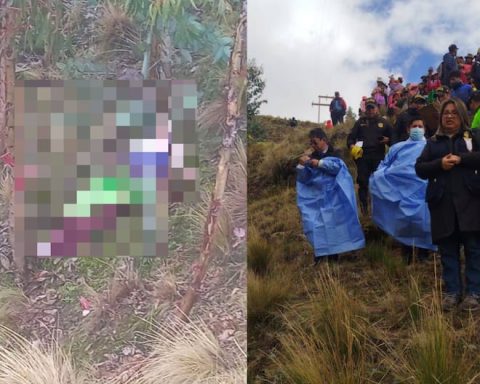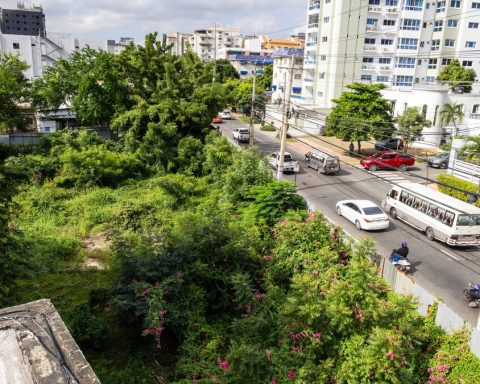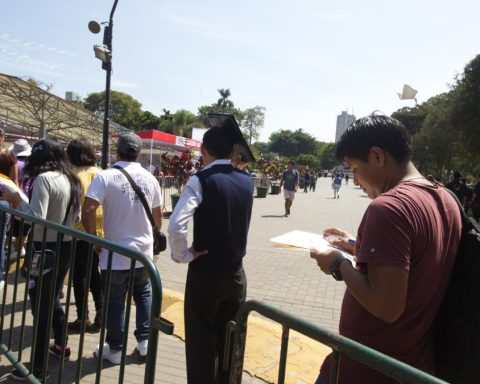Under a sun that at times is obscured by clouds that announce a midday rain, a long line of people extends in front of the headquarters of the Refuge Unit in La Uruca, in San José, the capital of Costa Rica. Many of them are high school students who, with backpacks full of dreams, have left behind a country where higher education opportunities have been drastically reduced under the control of Daniel Ortega’s regime.
Under the climate of that dying September, these young people seek not only refuge, but also the possibility of continuing with their studies, whether technical or university, depending on the opportunity they achieve on Costa Rican soil.
The exodus of Nicaraguan students has been a palpable reality since 2023, caused by the closure of more than 30 universities, the militarization of public campuses and the promotion of careers linked to the armed forces and the police by the regime.
Faced with this gloomy panorama, Costa Rica has become the destination of hope for hundreds of high school graduates who, instead of choosing a career within the options limited by the regime, decide to risk everything for a free academic life and a professional fulfillment of your choice and not an imposed one.
an education «trapped»
In recent years, the repression of the Ortega-Murillo regime has deeply affected the Nicaraguan educational system. The universities closed since 2021, many of them linked to religious organizations and with scholarship options, have been replaced by state institutions controlled by the ideological and military apparatus of the Ortega regime.
The last of these actions carried out by the regime and that ended up collapsing the educational panorama of Nicaragua was the seizure of the prestigious Central American University (UCA), from the Jesuit order, taken and confiscated in August 2023 and which left no options to almost 5,000 students.
Related news: IACHR denounces that some 37 thousand students have been affected by the arbitrary closure of universities in Nicaragua
As a result of the confiscation, thousands of its students canceled their courses, looked for options at Jesuit universities in El Salvador and Guatemala, and many others took refuge in the silent and timid private study houses that are still “standing” in the country.
«Better to leave than to humiliate yourself before the dictator»
Several of these students with whom we spoke at the entrance to the Refuge Unit of this neighboring country, explained for this report that in the state universities, both the old ones and those that were confiscated, the courses and their teaching staff are, for the most part, regime propagandists.

«They do not promote any professional education, nor critical thinking, nor are they inclusive, there is preference if you have ties with people from the government. They are no longer useful, there is no greater aspiration than to be servile and repeat what the regime says even if they are lies,” shares a university student.
He added that in the case of scholarships and resources for studies abroad, they are granted only to those who declare unconditional loyalty to the Sandinista Front “and to the commander,” as the propaganda calls the dictator Daniel Ortega.
“We have had to leave the country, look for alternatives outside the borders, but it is not easy, there is a lot of uncertainty, it is a long road with nothing certain, the truth is,” added the student. He recalled that every university student who wishes to enter the university must write a letter to Daniel Ortega as a mandatory requirement under the assumption that in this way, they would achieve some type of discount on fees.
«Now you have to humiliate yourself if you want to study, your effort in 11 years of study in primary and secondary school is of no use, you cannot aspire to a public university, which is the one you can go to because the economy is bad, if you do not first you drag before this man. “It’s outrageous,” he reproached.

Voices of hope
In front of the Refuge Unit in La Uruca and while waiting for their turn to request refuge and stay in that country, five more young Nicaraguans shared their stories for this report. They are all a reflection of the challenges faced by high school graduates who left their country in search of a free and dignified education.
Diana Martínez is one of them. He is 19 years old. She is originally from Estelí and dreamed since she was a child of studying medicine at the former Catholic University of the Dry Tropics.
His future seemed promising until his university was abruptly closed in 2022, when it was classified by the regime as an “opposition” institution and its entire teaching staff was replaced by militants from the Sandinista Front party.
The regime of Daniel Ortega and Rosario Murillo even changed its name and baptized it as the “Francisco Luis Espinoza Pineda” National University, in honor of a communist priest who died in a combat against the guards of the Somoza dictatorship in 1978.

The options offered to Diana in her city were limited: become a police officer or join the Army from its military academy in Managua. «I couldn’t be a soldier because I don’t want to, it’s not what I want for my life. They took away the opportunity to study what I wanted, but I’m not going to give up. Here in Costa Rica, I want to continue my career,” he says firmly.
Carlos Gutiérrez is a native of León. He is 18 years old. He says he decided to emigrate after facing constant harassment at the National Autonomous University of Nicaragua (UNAN), where he was enrolled in an Education degree. «Every time we participated in a lecture and mentioned something negative about the government, they pointed us out. They followed us on campus, and it was impossible to concentrate on studies. “I’m tired of the retaliation,” he said.
Now, Carlos is looking for a scholarship to study at a Costa Rican university, hoping to delve deeper into critical studies on human rights, something that in his country led him to be considered an “enemy of the State.”
«Closing of universities, extinguishes dreams»
Andrea Valdivia was a few months away from finishing her degree in Social Communication at the Central American University, UCA. He is 20 years old and finds it hard to believe that he lost everything when the Ortega-Murillo regime decided to close his university, claiming that “it was a center of terrorism.”
Related news: Jesuit universities in El Salvador and Guatemala raise funds to provide scholarships for UCA Nicaragua students
With tears in his eyes, he remembers how that moment changed his life. His mother studied at that university and two of his older brothers also graduated there. «Closing my university was like closing my dreams. My entire family has had to support me to get here, and although it is difficult to start from scratch, I know that in Costa Rica I will be able to achieve what they denied me in Nicaragua,” he said.
Her beloved university, for which she said she was proud, was renamed “Casimiro Sotelo” and the mere idea of seeing her name reflected on a diploma with that “insignificant” name for her, led her to accelerate the decision to migrate.

Just a few days after receiving his high school diploma in November 2023, Kevin López decided not to study in Nicaragua. The “toads (regime sympathizers) in his neighborhood” even invited him to apply for scholarships at Upoli and the National University of Engineering, close to his residence, but he rejected them with a simple excuse: “I’m going to study English first.” the 17-year-old told them.
His father, who worked in a state institution, was advised to enroll in the Police Academy or the Army Academy. “I don’t want to be part of their army or their police, or follow their agenda or be called a toad,” says Kevin, with a mixture of anger and determination.
He came to San José with his father and is now looking for a job in a Call Center with what he learned English this year and thus pay for a career that allows him to progress. «I want to study engineering, not shoot a gun. Here in Costa Rica, I have hope that I will be able to be what I really want,” he said.
The only way out, “flee the country”
Ana had already entered to study on a scholarship in Nicaragua, but her university was closed in 2023 for belonging to the Catholic Church. “I was on a scholarship at the Juan Pablo II University, there in the Huembes market, but last year they closed the campus and I didn’t want to return,” she said.
“I can’t stand the abuse, no matter how much need I have, my conscience does not allow me to continue studying there knowing that it was a Catholic center and now it is a Sandinista center,” he said.
“They sent me a call to enroll again, I told them that I was not going to study at a university controlled by the government, that I would assume the consequences, because for me, it would be worse to be complicit in an atrocity,” he explained.
Ana saw no other option but to migrate. «My only way out was to flee. “I am here to start over and achieve my dream of being a lawyer, something that is impossible in Nicaragua without aligning with the regime,” she stated.
The uncertain future of education in Nicaragua
The exodus of young students is just one of the many consequences of the Ortega-Murillo regime, which has dismantled not only the education system, but also the hopes of a new generation.
According to the former rector of the confiscated “Paulo Freire” University Adrián Meza, the universities that remain open in Nicaragua are under strong political control, limiting opportunities for critical thinking and professional development.
According to his vision, the young people of Nicaragua are in a cruel dilemma: those who decide to stay in Nicaragua face the harsh reality of having to choose between a career imposed by the regime or the persecution and curtailment of their critical thinking.
«The damage that the dictatorship of Daniel Ortega and Rosario Murillo is doing to Nicaragua is immense and irreversible in the future. “It is condemning generations of young people to mediocrity and unemployment, because it is not allowing them to exploit their creative and critical thoughts, but rather it is educating them to obey a dictatorship,” he said.
Related news: Universities of Guatemala and Costa Rica will receive applications from alumni of the UCA of Nicaragua
In this context, he said that the brain drain seems to be inevitable, and young people like Diana, Carlos, Andrea, Kevin and Ana are just a small sample of a phenomenon that affects thousands of Nicaraguan students.
They migrate after an academic and professional dream
The desire of young people to migrate is widely documented by research and surveys. According to the latest survey by the Americas Barometer “The pulse of democracy 2023″, published in Washington in November 2023, almost half of the 6.5 million Nicaraguans intend to migrate and of them 23% say they are ” very prepared” to leave the country in the near future.
The majority of those who think this way are young people between 18 and 25 years old. That is, the population of university academic age. This year, the intention did not change, but rather increased: more than 65% of young people want to emigrate, according to a Cid Gallup survey published by Confidencial in September of this year.
Faced with the possibility of emigrating, 55.4% of the population expressed a high probability of doing so, while only 40.6% stated that this decision was not at all or unlikely. The migration crisis is worsening among young people, where almost 70% of those surveyed between 16 and 24 years old expressed their desire to leave the country.
The intention to emigrate transcends political divisions, as even 43.5% of Sandinista sympathizers expressed their desire to leave the country as well. Most of them are motivated to leave the country mainly for economic reasons: the search for better salaries (37.4%) and the difficult economic situation of the country (33.7%).
The United States continues to be the most dreamed destination (43.4%), but Spain is also frequently mentioned, followed by Costa Rica and Panama.
